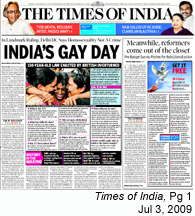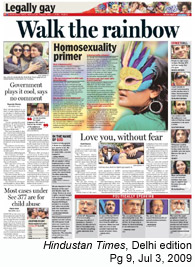Proclaiming Jul 2 as "India's Gay Day" following the ruling, the Times of India declared in its editorial titled "Victory For Choice" on Friday that by legalising same-sex relations, the court had "restored the personal freedom and rights of homosexuals."

The ruling on Thursday overturns a 148-year-old colonial law which describes a same-sex relationship as an "unnatural offence" punishable by a 10-year prison sentence.
"This is a welcome step forward. The criminalisation of homosexuality is a relic of the past, introduced by the British in 1861."
The editorial said the ruling should "act as a catalyst, encouraging our legislators to shed their blinkers and take a more progressive view on the issue," the Times said.
"In 21st century India, it is perverse to penalise adults for their sexual choices."
- Victory for choice (Times of India)

The Hindustan Times launched a special online section titled "Gay victory" compiling news and video reports, podcasts and photo galleries. The headline story "It's okay to be gay" described the ruling as a "giant step towards globalisation."
"It took 150 years for us India - and 42 years after Britain itself had made homosexuality legal- to figure out that we didn't have a problem with same-sex relationships."
The newspaper said "homosexuality and heterosexuality aren't divisive, emotive issues in Middle India - sexuality is, especially when it concerns women and their perceived behaviour in a still male-dominated, anti-woman society at large."
- Gay victory (Hindustan Times)
- It’s okay to be gay (Hindustan Times)
In an editorial titled "Forward march", DNA India on Friday said: "By finding Section 377 discriminatory by its targeting a section of people for their sexual preferences, the court has managed to move India forward. Society is changing and with it the laws must change too. There is a need to recognise that a section of our society cannot be stigmatised to the extent of being labelled criminals for their sexual preferences, especially if they are consenting adults."
Having noted protests by religious leaders to the ruling, it countered: "But while their right to a point of view is acceptable, to bring religion into this debate is wholly unnecessary - this has to be a social and legal debate."
- Forward march (DNA India)
"July 2, 2009 is a historic day. Not just for lesbians, gays, bisexuals, transgender, hijras and kothis in India, but also for all those who strive to uphold the values of equality, freedom, non-discrimination and inclusiveness in India," wrote Ponni Arasu, a queer feminist and activist, and researcher at the Alternative Law Forum, Bengaluru, in the Deccan Chronicle.
"The symbolic significance of this judgment is beyond measure.
"The constitutional framework within which it has been placed gives it enormous legitimacy, strength and significance. In legal terms, it only applies to Delhi but is a strong precedent that can be used in any other parallel court in this country. While other courts are free to disagree, they will have to counter the Delhi high court judgment substantially, a task that is close to impossible."
- State shifts out of bedroom, allows some basic rights (Deccan Chronicle)
Anil Bhanot, General Secretary Hindu Council UK, said he Hindu scripts describe the homosexual condition to be a "biological one, and although the scripture gives guidance to parents on how to avoid procreating a homosexual child, it does not condemn the child as unnatural.
"Hinduism prescribes 16 ceremonies to mark each major stage in one's life span. We would usually observe the birth, name, adolescence, marriage, retirement and death ceremonies but there is a little known ceremony called the "insemination" ceremony or the Garbhadan Sanskaar, which I am sure nobody observes now-days."
- Hinduism does not condemn gay people: UK Hindu Council (Indian Express)
Anand Grover, the lawyer who argued the case before New Delhi High Court, described the decision as an "historic event because India was the country where the anti-sodomy laws were first statutorised... and the same law was then replicated all over the British Commonwealth."
He added that countries that still outlaw homosexual sex can now "use this as a precedent."
"Countries in Africa can use this as a precedent. Same for Asia."
- India gay sex ruling could set precedent: UN (Times of India)
